International Criminal Court: Politics & Power
VerifiedAdded on 2020/04/29
|10
|2416
|64
AI Summary
This assignment delves into the complex relationship between the International Criminal Court (ICC) and the forces of politics and power. It examines how political considerations and power dynamics influence the ICC's operations, decision-making processes, and ultimately, its ability to deliver justice for international crimes such as genocide, crimes against humanity, and war crimes. The analysis considers criticisms levied against the ICC and explores the challenges posed by state sovereignty and power imbalances in the global system.
Contribute Materials
Your contribution can guide someone’s learning journey. Share your
documents today.

Running Head: Law 1
Law
Law
Secure Best Marks with AI Grader
Need help grading? Try our AI Grader for instant feedback on your assignments.
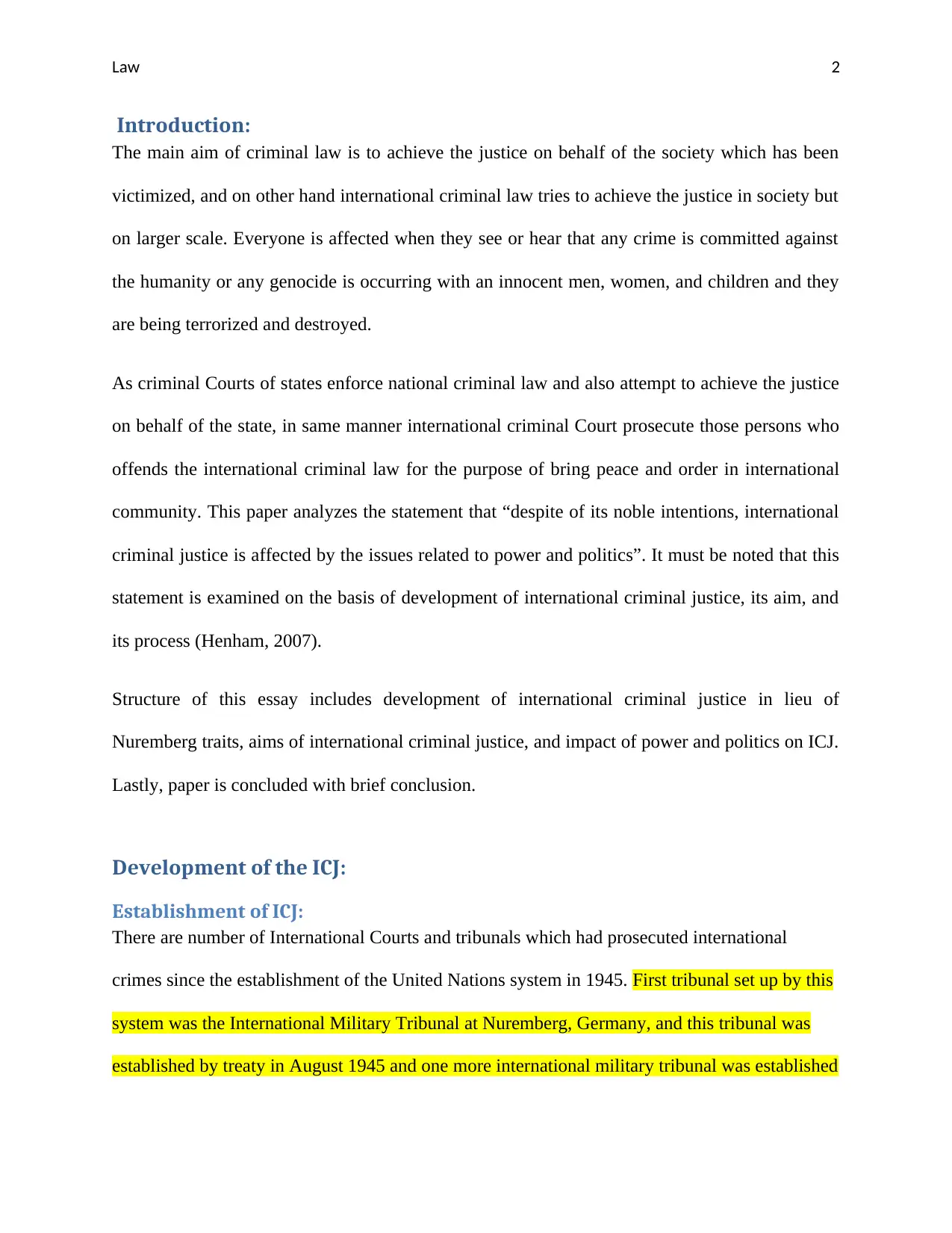
Law 2
Introduction:
The main aim of criminal law is to achieve the justice on behalf of the society which has been
victimized, and on other hand international criminal law tries to achieve the justice in society but
on larger scale. Everyone is affected when they see or hear that any crime is committed against
the humanity or any genocide is occurring with an innocent men, women, and children and they
are being terrorized and destroyed.
As criminal Courts of states enforce national criminal law and also attempt to achieve the justice
on behalf of the state, in same manner international criminal Court prosecute those persons who
offends the international criminal law for the purpose of bring peace and order in international
community. This paper analyzes the statement that “despite of its noble intentions, international
criminal justice is affected by the issues related to power and politics”. It must be noted that this
statement is examined on the basis of development of international criminal justice, its aim, and
its process (Henham, 2007).
Structure of this essay includes development of international criminal justice in lieu of
Nuremberg traits, aims of international criminal justice, and impact of power and politics on ICJ.
Lastly, paper is concluded with brief conclusion.
Development of the ICJ:
Establishment of ICJ:
There are number of International Courts and tribunals which had prosecuted international
crimes since the establishment of the United Nations system in 1945. First tribunal set up by this
system was the International Military Tribunal at Nuremberg, Germany, and this tribunal was
established by treaty in August 1945 and one more international military tribunal was established
Introduction:
The main aim of criminal law is to achieve the justice on behalf of the society which has been
victimized, and on other hand international criminal law tries to achieve the justice in society but
on larger scale. Everyone is affected when they see or hear that any crime is committed against
the humanity or any genocide is occurring with an innocent men, women, and children and they
are being terrorized and destroyed.
As criminal Courts of states enforce national criminal law and also attempt to achieve the justice
on behalf of the state, in same manner international criminal Court prosecute those persons who
offends the international criminal law for the purpose of bring peace and order in international
community. This paper analyzes the statement that “despite of its noble intentions, international
criminal justice is affected by the issues related to power and politics”. It must be noted that this
statement is examined on the basis of development of international criminal justice, its aim, and
its process (Henham, 2007).
Structure of this essay includes development of international criminal justice in lieu of
Nuremberg traits, aims of international criminal justice, and impact of power and politics on ICJ.
Lastly, paper is concluded with brief conclusion.
Development of the ICJ:
Establishment of ICJ:
There are number of International Courts and tribunals which had prosecuted international
crimes since the establishment of the United Nations system in 1945. First tribunal set up by this
system was the International Military Tribunal at Nuremberg, Germany, and this tribunal was
established by treaty in August 1945 and one more international military tribunal was established
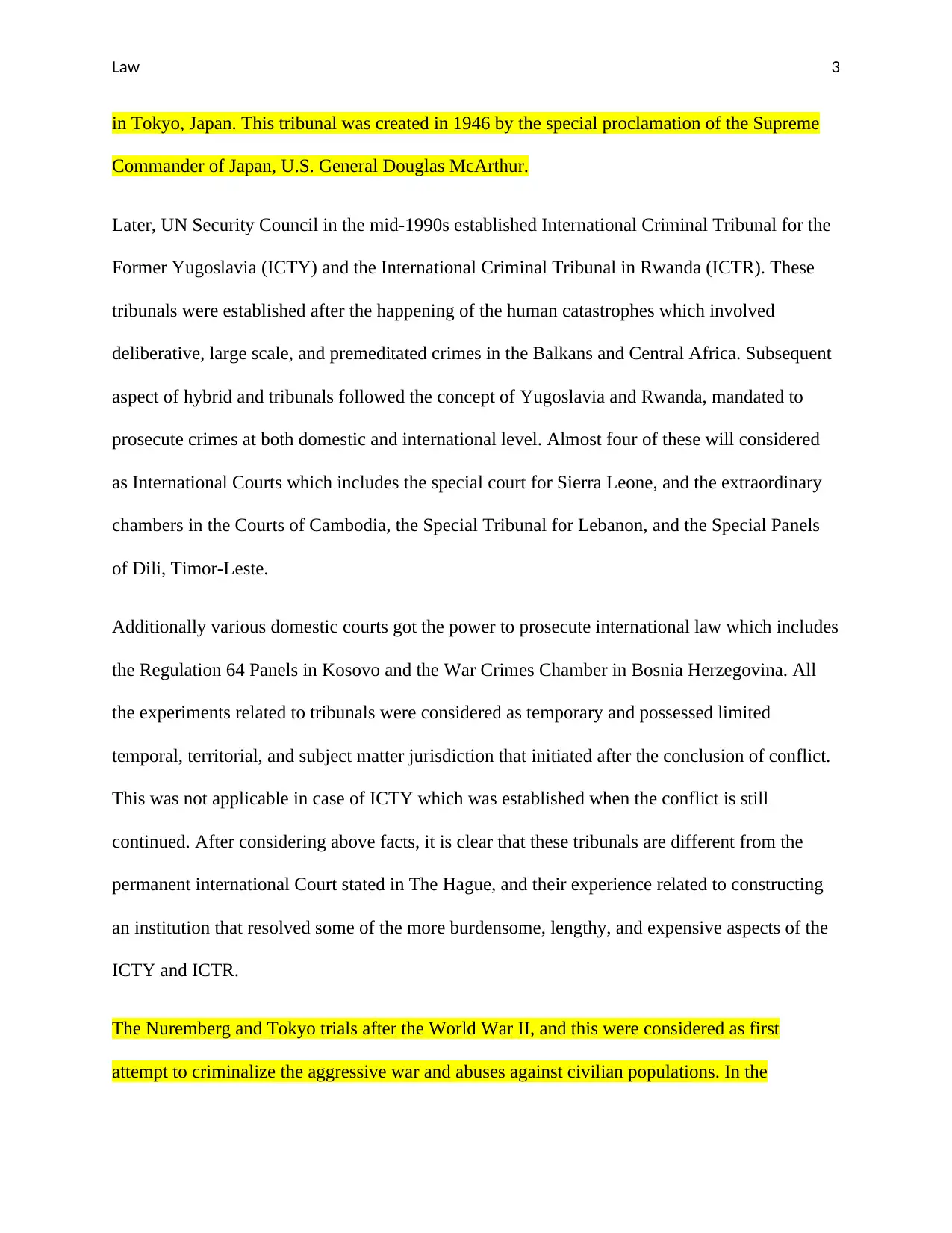
Law 3
in Tokyo, Japan. This tribunal was created in 1946 by the special proclamation of the Supreme
Commander of Japan, U.S. General Douglas McArthur.
Later, UN Security Council in the mid-1990s established International Criminal Tribunal for the
Former Yugoslavia (ICTY) and the International Criminal Tribunal in Rwanda (ICTR). These
tribunals were established after the happening of the human catastrophes which involved
deliberative, large scale, and premeditated crimes in the Balkans and Central Africa. Subsequent
aspect of hybrid and tribunals followed the concept of Yugoslavia and Rwanda, mandated to
prosecute crimes at both domestic and international level. Almost four of these will considered
as International Courts which includes the special court for Sierra Leone, and the extraordinary
chambers in the Courts of Cambodia, the Special Tribunal for Lebanon, and the Special Panels
of Dili, Timor-Leste.
Additionally various domestic courts got the power to prosecute international law which includes
the Regulation 64 Panels in Kosovo and the War Crimes Chamber in Bosnia Herzegovina. All
the experiments related to tribunals were considered as temporary and possessed limited
temporal, territorial, and subject matter jurisdiction that initiated after the conclusion of conflict.
This was not applicable in case of ICTY which was established when the conflict is still
continued. After considering above facts, it is clear that these tribunals are different from the
permanent international Court stated in The Hague, and their experience related to constructing
an institution that resolved some of the more burdensome, lengthy, and expensive aspects of the
ICTY and ICTR.
The Nuremberg and Tokyo trials after the World War II, and this were considered as first
attempt to criminalize the aggressive war and abuses against civilian populations. In the
in Tokyo, Japan. This tribunal was created in 1946 by the special proclamation of the Supreme
Commander of Japan, U.S. General Douglas McArthur.
Later, UN Security Council in the mid-1990s established International Criminal Tribunal for the
Former Yugoslavia (ICTY) and the International Criminal Tribunal in Rwanda (ICTR). These
tribunals were established after the happening of the human catastrophes which involved
deliberative, large scale, and premeditated crimes in the Balkans and Central Africa. Subsequent
aspect of hybrid and tribunals followed the concept of Yugoslavia and Rwanda, mandated to
prosecute crimes at both domestic and international level. Almost four of these will considered
as International Courts which includes the special court for Sierra Leone, and the extraordinary
chambers in the Courts of Cambodia, the Special Tribunal for Lebanon, and the Special Panels
of Dili, Timor-Leste.
Additionally various domestic courts got the power to prosecute international law which includes
the Regulation 64 Panels in Kosovo and the War Crimes Chamber in Bosnia Herzegovina. All
the experiments related to tribunals were considered as temporary and possessed limited
temporal, territorial, and subject matter jurisdiction that initiated after the conclusion of conflict.
This was not applicable in case of ICTY which was established when the conflict is still
continued. After considering above facts, it is clear that these tribunals are different from the
permanent international Court stated in The Hague, and their experience related to constructing
an institution that resolved some of the more burdensome, lengthy, and expensive aspects of the
ICTY and ICTR.
The Nuremberg and Tokyo trials after the World War II, and this were considered as first
attempt to criminalize the aggressive war and abuses against civilian populations. In the
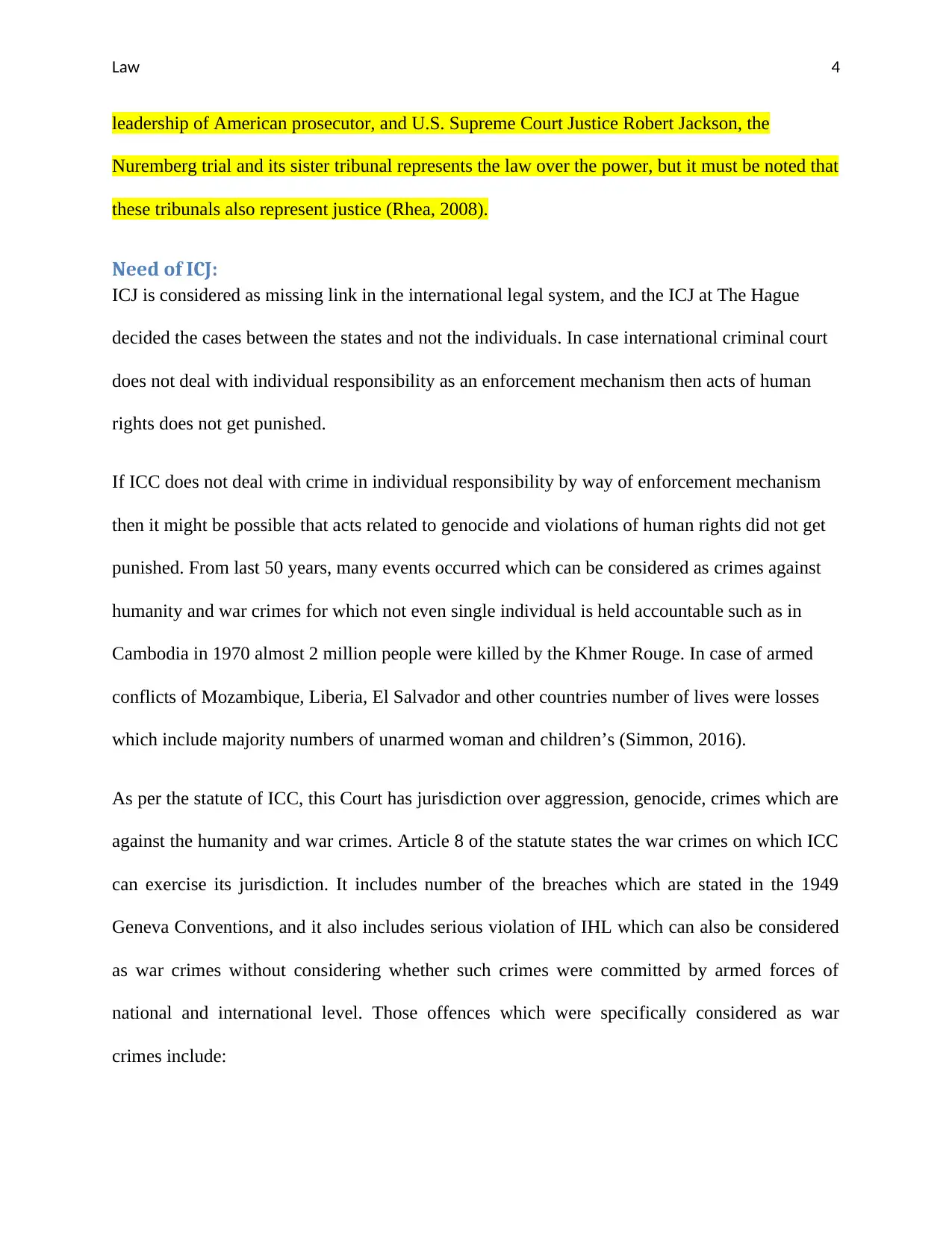
Law 4
leadership of American prosecutor, and U.S. Supreme Court Justice Robert Jackson, the
Nuremberg trial and its sister tribunal represents the law over the power, but it must be noted that
these tribunals also represent justice (Rhea, 2008).
Need of ICJ:
ICJ is considered as missing link in the international legal system, and the ICJ at The Hague
decided the cases between the states and not the individuals. In case international criminal court
does not deal with individual responsibility as an enforcement mechanism then acts of human
rights does not get punished.
If ICC does not deal with crime in individual responsibility by way of enforcement mechanism
then it might be possible that acts related to genocide and violations of human rights did not get
punished. From last 50 years, many events occurred which can be considered as crimes against
humanity and war crimes for which not even single individual is held accountable such as in
Cambodia in 1970 almost 2 million people were killed by the Khmer Rouge. In case of armed
conflicts of Mozambique, Liberia, El Salvador and other countries number of lives were losses
which include majority numbers of unarmed woman and children’s (Simmon, 2016).
As per the statute of ICC, this Court has jurisdiction over aggression, genocide, crimes which are
against the humanity and war crimes. Article 8 of the statute states the war crimes on which ICC
can exercise its jurisdiction. It includes number of the breaches which are stated in the 1949
Geneva Conventions, and it also includes serious violation of IHL which can also be considered
as war crimes without considering whether such crimes were committed by armed forces of
national and international level. Those offences which were specifically considered as war
crimes include:
leadership of American prosecutor, and U.S. Supreme Court Justice Robert Jackson, the
Nuremberg trial and its sister tribunal represents the law over the power, but it must be noted that
these tribunals also represent justice (Rhea, 2008).
Need of ICJ:
ICJ is considered as missing link in the international legal system, and the ICJ at The Hague
decided the cases between the states and not the individuals. In case international criminal court
does not deal with individual responsibility as an enforcement mechanism then acts of human
rights does not get punished.
If ICC does not deal with crime in individual responsibility by way of enforcement mechanism
then it might be possible that acts related to genocide and violations of human rights did not get
punished. From last 50 years, many events occurred which can be considered as crimes against
humanity and war crimes for which not even single individual is held accountable such as in
Cambodia in 1970 almost 2 million people were killed by the Khmer Rouge. In case of armed
conflicts of Mozambique, Liberia, El Salvador and other countries number of lives were losses
which include majority numbers of unarmed woman and children’s (Simmon, 2016).
As per the statute of ICC, this Court has jurisdiction over aggression, genocide, crimes which are
against the humanity and war crimes. Article 8 of the statute states the war crimes on which ICC
can exercise its jurisdiction. It includes number of the breaches which are stated in the 1949
Geneva Conventions, and it also includes serious violation of IHL which can also be considered
as war crimes without considering whether such crimes were committed by armed forces of
national and international level. Those offences which were specifically considered as war
crimes include:
Secure Best Marks with AI Grader
Need help grading? Try our AI Grader for instant feedback on your assignments.
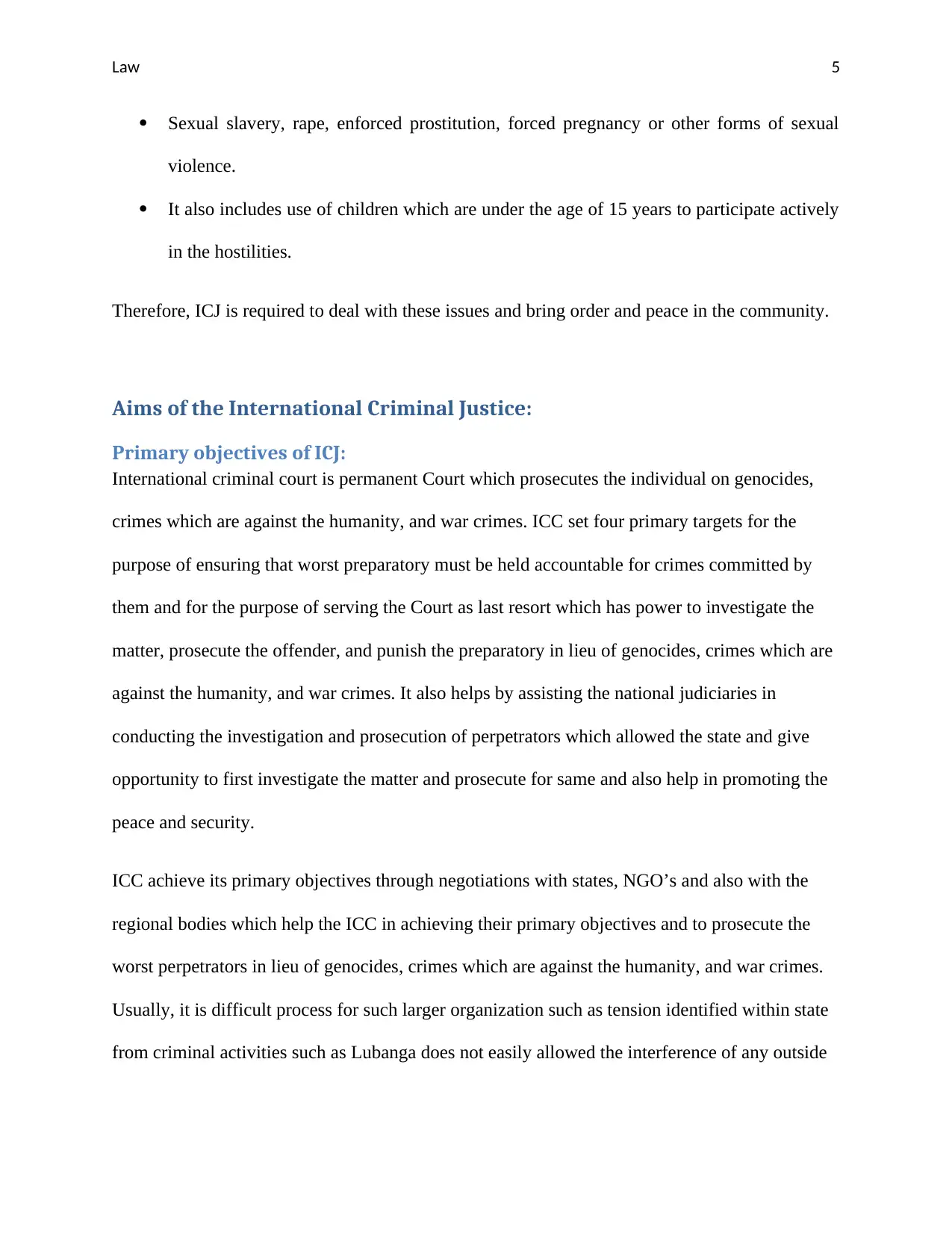
Law 5
Sexual slavery, rape, enforced prostitution, forced pregnancy or other forms of sexual
violence.
It also includes use of children which are under the age of 15 years to participate actively
in the hostilities.
Therefore, ICJ is required to deal with these issues and bring order and peace in the community.
Aims of the International Criminal Justice:
Primary objectives of ICJ:
International criminal court is permanent Court which prosecutes the individual on genocides,
crimes which are against the humanity, and war crimes. ICC set four primary targets for the
purpose of ensuring that worst preparatory must be held accountable for crimes committed by
them and for the purpose of serving the Court as last resort which has power to investigate the
matter, prosecute the offender, and punish the preparatory in lieu of genocides, crimes which are
against the humanity, and war crimes. It also helps by assisting the national judiciaries in
conducting the investigation and prosecution of perpetrators which allowed the state and give
opportunity to first investigate the matter and prosecute for same and also help in promoting the
peace and security.
ICC achieve its primary objectives through negotiations with states, NGO’s and also with the
regional bodies which help the ICC in achieving their primary objectives and to prosecute the
worst perpetrators in lieu of genocides, crimes which are against the humanity, and war crimes.
Usually, it is difficult process for such larger organization such as tension identified within state
from criminal activities such as Lubanga does not easily allowed the interference of any outside
Sexual slavery, rape, enforced prostitution, forced pregnancy or other forms of sexual
violence.
It also includes use of children which are under the age of 15 years to participate actively
in the hostilities.
Therefore, ICJ is required to deal with these issues and bring order and peace in the community.
Aims of the International Criminal Justice:
Primary objectives of ICJ:
International criminal court is permanent Court which prosecutes the individual on genocides,
crimes which are against the humanity, and war crimes. ICC set four primary targets for the
purpose of ensuring that worst preparatory must be held accountable for crimes committed by
them and for the purpose of serving the Court as last resort which has power to investigate the
matter, prosecute the offender, and punish the preparatory in lieu of genocides, crimes which are
against the humanity, and war crimes. It also helps by assisting the national judiciaries in
conducting the investigation and prosecution of perpetrators which allowed the state and give
opportunity to first investigate the matter and prosecute for same and also help in promoting the
peace and security.
ICC achieve its primary objectives through negotiations with states, NGO’s and also with the
regional bodies which help the ICC in achieving their primary objectives and to prosecute the
worst perpetrators in lieu of genocides, crimes which are against the humanity, and war crimes.
Usually, it is difficult process for such larger organization such as tension identified within state
from criminal activities such as Lubanga does not easily allowed the interference of any outside
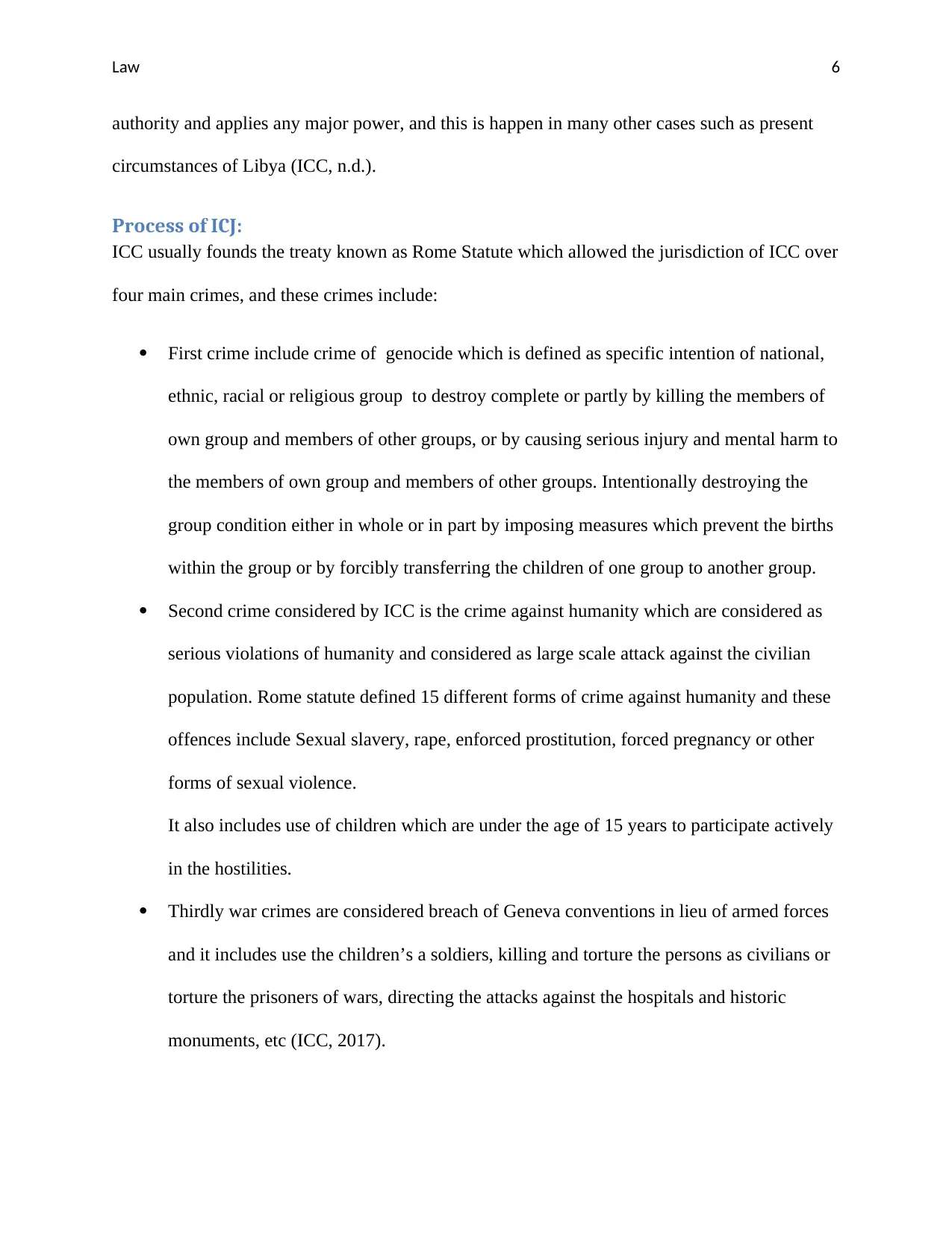
Law 6
authority and applies any major power, and this is happen in many other cases such as present
circumstances of Libya (ICC, n.d.).
Process of ICJ:
ICC usually founds the treaty known as Rome Statute which allowed the jurisdiction of ICC over
four main crimes, and these crimes include:
First crime include crime of genocide which is defined as specific intention of national,
ethnic, racial or religious group to destroy complete or partly by killing the members of
own group and members of other groups, or by causing serious injury and mental harm to
the members of own group and members of other groups. Intentionally destroying the
group condition either in whole or in part by imposing measures which prevent the births
within the group or by forcibly transferring the children of one group to another group.
Second crime considered by ICC is the crime against humanity which are considered as
serious violations of humanity and considered as large scale attack against the civilian
population. Rome statute defined 15 different forms of crime against humanity and these
offences include Sexual slavery, rape, enforced prostitution, forced pregnancy or other
forms of sexual violence.
It also includes use of children which are under the age of 15 years to participate actively
in the hostilities.
Thirdly war crimes are considered breach of Geneva conventions in lieu of armed forces
and it includes use the children’s a soldiers, killing and torture the persons as civilians or
torture the prisoners of wars, directing the attacks against the hospitals and historic
monuments, etc (ICC, 2017).
authority and applies any major power, and this is happen in many other cases such as present
circumstances of Libya (ICC, n.d.).
Process of ICJ:
ICC usually founds the treaty known as Rome Statute which allowed the jurisdiction of ICC over
four main crimes, and these crimes include:
First crime include crime of genocide which is defined as specific intention of national,
ethnic, racial or religious group to destroy complete or partly by killing the members of
own group and members of other groups, or by causing serious injury and mental harm to
the members of own group and members of other groups. Intentionally destroying the
group condition either in whole or in part by imposing measures which prevent the births
within the group or by forcibly transferring the children of one group to another group.
Second crime considered by ICC is the crime against humanity which are considered as
serious violations of humanity and considered as large scale attack against the civilian
population. Rome statute defined 15 different forms of crime against humanity and these
offences include Sexual slavery, rape, enforced prostitution, forced pregnancy or other
forms of sexual violence.
It also includes use of children which are under the age of 15 years to participate actively
in the hostilities.
Thirdly war crimes are considered breach of Geneva conventions in lieu of armed forces
and it includes use the children’s a soldiers, killing and torture the persons as civilians or
torture the prisoners of wars, directing the attacks against the hospitals and historic
monuments, etc (ICC, 2017).
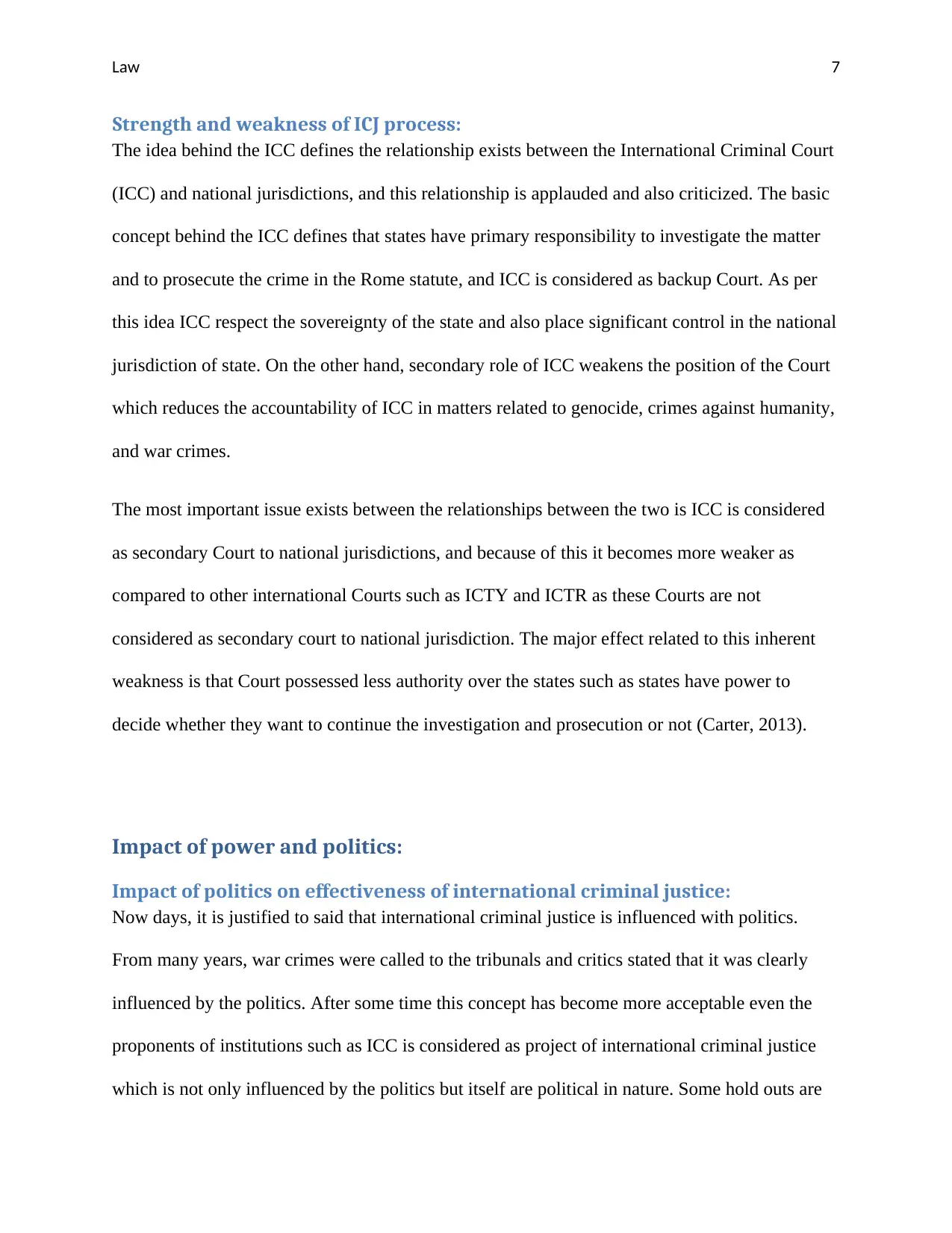
Law 7
Strength and weakness of ICJ process:
The idea behind the ICC defines the relationship exists between the International Criminal Court
(ICC) and national jurisdictions, and this relationship is applauded and also criticized. The basic
concept behind the ICC defines that states have primary responsibility to investigate the matter
and to prosecute the crime in the Rome statute, and ICC is considered as backup Court. As per
this idea ICC respect the sovereignty of the state and also place significant control in the national
jurisdiction of state. On the other hand, secondary role of ICC weakens the position of the Court
which reduces the accountability of ICC in matters related to genocide, crimes against humanity,
and war crimes.
The most important issue exists between the relationships between the two is ICC is considered
as secondary Court to national jurisdictions, and because of this it becomes more weaker as
compared to other international Courts such as ICTY and ICTR as these Courts are not
considered as secondary court to national jurisdiction. The major effect related to this inherent
weakness is that Court possessed less authority over the states such as states have power to
decide whether they want to continue the investigation and prosecution or not (Carter, 2013).
Impact of power and politics:
Impact of politics on effectiveness of international criminal justice:
Now days, it is justified to said that international criminal justice is influenced with politics.
From many years, war crimes were called to the tribunals and critics stated that it was clearly
influenced by the politics. After some time this concept has become more acceptable even the
proponents of institutions such as ICC is considered as project of international criminal justice
which is not only influenced by the politics but itself are political in nature. Some hold outs are
Strength and weakness of ICJ process:
The idea behind the ICC defines the relationship exists between the International Criminal Court
(ICC) and national jurisdictions, and this relationship is applauded and also criticized. The basic
concept behind the ICC defines that states have primary responsibility to investigate the matter
and to prosecute the crime in the Rome statute, and ICC is considered as backup Court. As per
this idea ICC respect the sovereignty of the state and also place significant control in the national
jurisdiction of state. On the other hand, secondary role of ICC weakens the position of the Court
which reduces the accountability of ICC in matters related to genocide, crimes against humanity,
and war crimes.
The most important issue exists between the relationships between the two is ICC is considered
as secondary Court to national jurisdictions, and because of this it becomes more weaker as
compared to other international Courts such as ICTY and ICTR as these Courts are not
considered as secondary court to national jurisdiction. The major effect related to this inherent
weakness is that Court possessed less authority over the states such as states have power to
decide whether they want to continue the investigation and prosecution or not (Carter, 2013).
Impact of power and politics:
Impact of politics on effectiveness of international criminal justice:
Now days, it is justified to said that international criminal justice is influenced with politics.
From many years, war crimes were called to the tribunals and critics stated that it was clearly
influenced by the politics. After some time this concept has become more acceptable even the
proponents of institutions such as ICC is considered as project of international criminal justice
which is not only influenced by the politics but itself are political in nature. Some hold outs are
Paraphrase This Document
Need a fresh take? Get an instant paraphrase of this document with our AI Paraphraser
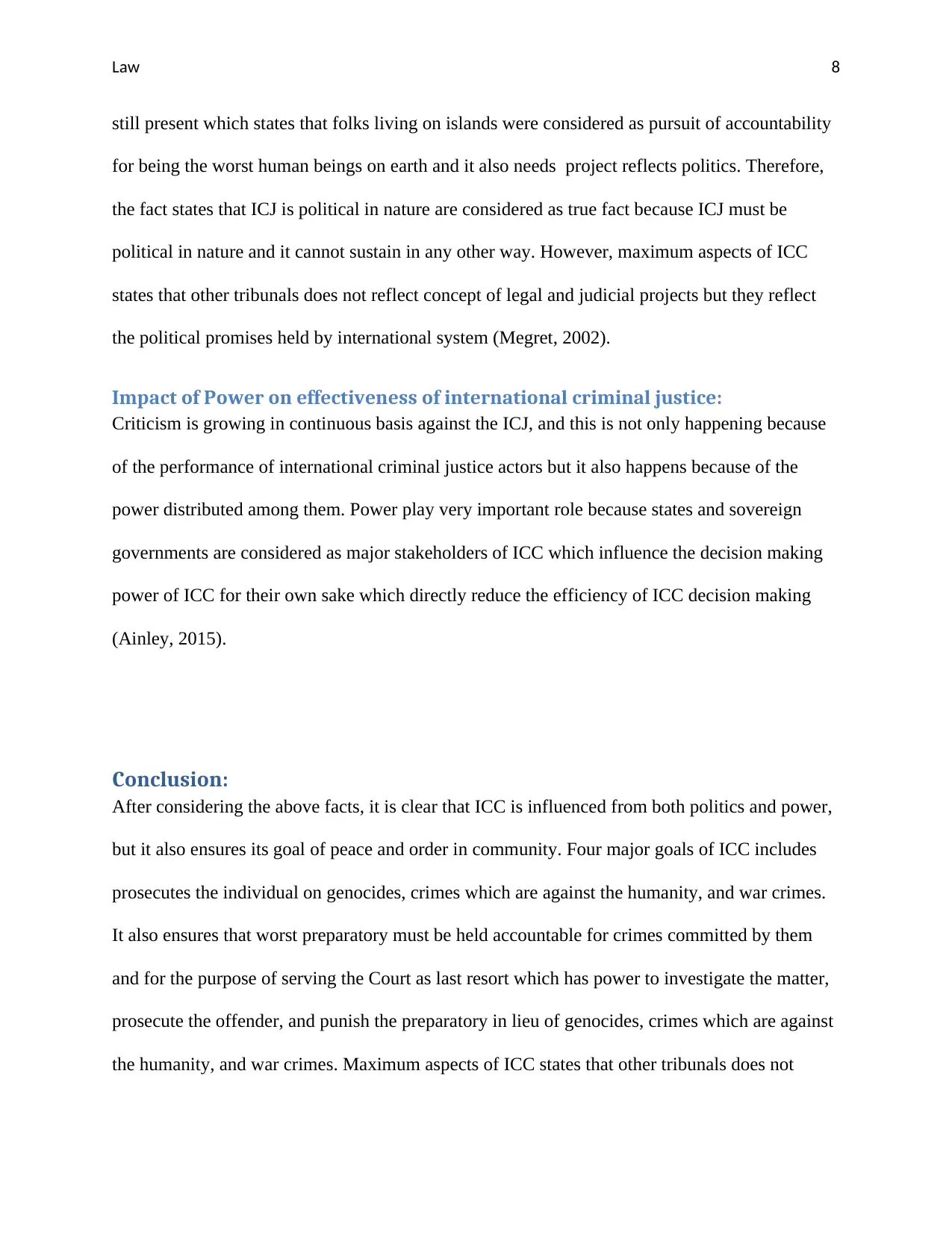
Law 8
still present which states that folks living on islands were considered as pursuit of accountability
for being the worst human beings on earth and it also needs project reflects politics. Therefore,
the fact states that ICJ is political in nature are considered as true fact because ICJ must be
political in nature and it cannot sustain in any other way. However, maximum aspects of ICC
states that other tribunals does not reflect concept of legal and judicial projects but they reflect
the political promises held by international system (Megret, 2002).
Impact of Power on effectiveness of international criminal justice:
Criticism is growing in continuous basis against the ICJ, and this is not only happening because
of the performance of international criminal justice actors but it also happens because of the
power distributed among them. Power play very important role because states and sovereign
governments are considered as major stakeholders of ICC which influence the decision making
power of ICC for their own sake which directly reduce the efficiency of ICC decision making
(Ainley, 2015).
Conclusion:
After considering the above facts, it is clear that ICC is influenced from both politics and power,
but it also ensures its goal of peace and order in community. Four major goals of ICC includes
prosecutes the individual on genocides, crimes which are against the humanity, and war crimes.
It also ensures that worst preparatory must be held accountable for crimes committed by them
and for the purpose of serving the Court as last resort which has power to investigate the matter,
prosecute the offender, and punish the preparatory in lieu of genocides, crimes which are against
the humanity, and war crimes. Maximum aspects of ICC states that other tribunals does not
still present which states that folks living on islands were considered as pursuit of accountability
for being the worst human beings on earth and it also needs project reflects politics. Therefore,
the fact states that ICJ is political in nature are considered as true fact because ICJ must be
political in nature and it cannot sustain in any other way. However, maximum aspects of ICC
states that other tribunals does not reflect concept of legal and judicial projects but they reflect
the political promises held by international system (Megret, 2002).
Impact of Power on effectiveness of international criminal justice:
Criticism is growing in continuous basis against the ICJ, and this is not only happening because
of the performance of international criminal justice actors but it also happens because of the
power distributed among them. Power play very important role because states and sovereign
governments are considered as major stakeholders of ICC which influence the decision making
power of ICC for their own sake which directly reduce the efficiency of ICC decision making
(Ainley, 2015).
Conclusion:
After considering the above facts, it is clear that ICC is influenced from both politics and power,
but it also ensures its goal of peace and order in community. Four major goals of ICC includes
prosecutes the individual on genocides, crimes which are against the humanity, and war crimes.
It also ensures that worst preparatory must be held accountable for crimes committed by them
and for the purpose of serving the Court as last resort which has power to investigate the matter,
prosecute the offender, and punish the preparatory in lieu of genocides, crimes which are against
the humanity, and war crimes. Maximum aspects of ICC states that other tribunals does not
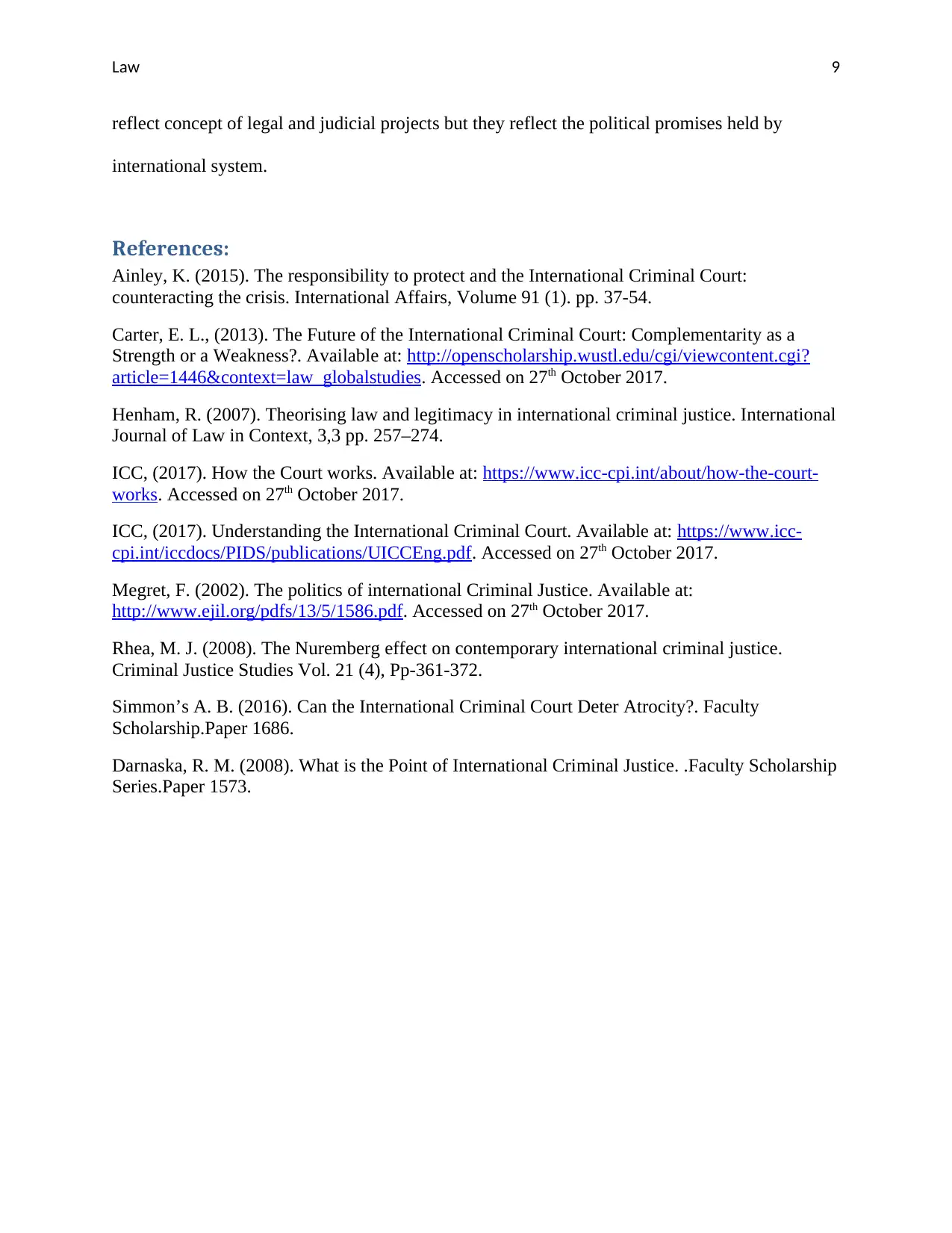
Law 9
reflect concept of legal and judicial projects but they reflect the political promises held by
international system.
References:
Ainley, K. (2015). The responsibility to protect and the International Criminal Court:
counteracting the crisis. International Affairs, Volume 91 (1). pp. 37-54.
Carter, E. L., (2013). The Future of the International Criminal Court: Complementarity as a
Strength or a Weakness?. Available at: http://openscholarship.wustl.edu/cgi/viewcontent.cgi?
article=1446&context=law_globalstudies. Accessed on 27th October 2017.
Henham, R. (2007). Theorising law and legitimacy in international criminal justice. International
Journal of Law in Context, 3,3 pp. 257–274.
ICC, (2017). How the Court works. Available at: https://www.icc-cpi.int/about/how-the-court-
works. Accessed on 27th October 2017.
ICC, (2017). Understanding the International Criminal Court. Available at: https://www.icc-
cpi.int/iccdocs/PIDS/publications/UICCEng.pdf. Accessed on 27th October 2017.
Megret, F. (2002). The politics of international Criminal Justice. Available at:
http://www.ejil.org/pdfs/13/5/1586.pdf. Accessed on 27th October 2017.
Rhea, M. J. (2008). The Nuremberg effect on contemporary international criminal justice.
Criminal Justice Studies Vol. 21 (4), Pp-361-372.
Simmon’s A. B. (2016). Can the International Criminal Court Deter Atrocity?. Faculty
Scholarship.Paper 1686.
Darnaska, R. M. (2008). What is the Point of International Criminal Justice. .Faculty Scholarship
Series.Paper 1573.
reflect concept of legal and judicial projects but they reflect the political promises held by
international system.
References:
Ainley, K. (2015). The responsibility to protect and the International Criminal Court:
counteracting the crisis. International Affairs, Volume 91 (1). pp. 37-54.
Carter, E. L., (2013). The Future of the International Criminal Court: Complementarity as a
Strength or a Weakness?. Available at: http://openscholarship.wustl.edu/cgi/viewcontent.cgi?
article=1446&context=law_globalstudies. Accessed on 27th October 2017.
Henham, R. (2007). Theorising law and legitimacy in international criminal justice. International
Journal of Law in Context, 3,3 pp. 257–274.
ICC, (2017). How the Court works. Available at: https://www.icc-cpi.int/about/how-the-court-
works. Accessed on 27th October 2017.
ICC, (2017). Understanding the International Criminal Court. Available at: https://www.icc-
cpi.int/iccdocs/PIDS/publications/UICCEng.pdf. Accessed on 27th October 2017.
Megret, F. (2002). The politics of international Criminal Justice. Available at:
http://www.ejil.org/pdfs/13/5/1586.pdf. Accessed on 27th October 2017.
Rhea, M. J. (2008). The Nuremberg effect on contemporary international criminal justice.
Criminal Justice Studies Vol. 21 (4), Pp-361-372.
Simmon’s A. B. (2016). Can the International Criminal Court Deter Atrocity?. Faculty
Scholarship.Paper 1686.
Darnaska, R. M. (2008). What is the Point of International Criminal Justice. .Faculty Scholarship
Series.Paper 1573.

Law 10
1 out of 10
Related Documents
Your All-in-One AI-Powered Toolkit for Academic Success.
+13062052269
info@desklib.com
Available 24*7 on WhatsApp / Email
![[object Object]](/_next/static/media/star-bottom.7253800d.svg)
Unlock your academic potential
© 2024 | Zucol Services PVT LTD | All rights reserved.





